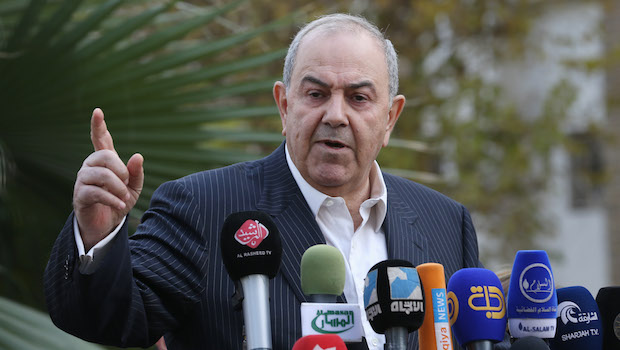London, Asharq Al-Awsat—Former Iraqi Prime Minister Iyad Allawi, head of the Iraqi National Accord party, has confirmed he has no intention to retire from politics, saying he will lead the new Wataniya bloc in the parliamentary elections scheduled to take place on April 30, 2014.
Following the fragmentation of the Iraqiya bloc, which won the most votes in the last election but was unable to form a government, allowing Prime Minister Nuri Al-Maliki to win a second term in office, Allawi has formed the new Wataniya bloc to contest the forthcoming elections.
Speaking to Asharq Al-Awsat from Baghdad on Tuesday, Allawi said: “We came into politics to serve our people, not in search of personal gains. The course of the elections must be corrected and the elections and parties law must be ratified. We insist that the next elections must be transparent and fair in order to allow the Iraqi people to have their say through the ballot box.”
Speculation about Allawi’s retirement has been rife, but he confirmed that he has no intention of leaving the Iraqi political scene. In a statement issued by his office, Allawi said: “Now, on the eve of elections, the political process must be reformed; otherwise, I will not take part in a political process that harms Iraqi national unity and that harms the Islamic and Arab identity of Iraq.”
In previous comments to Asharq Al-Awsat, Allawi said: “There is no crisis among Iraqis, [whether] Shi’ites or Sunnis, and everyone knows that. The crisis is political and is among politicians, but they want to make it seem like it is sectarian. The real problem is that the political process is built on political sectarianism, and on the basis of marginalization and exclusion.”
“This problem allowed foreign countries, particularly Iran, to enter the heart of Iraqi politics and interfere in Iraqi affairs and secure influence, which has reached a point where it draws red lines for political figures and parties,” he said.
The former Iraqiya bloc leader criticized Iranian “interference” in Iraqi political decision-making, saying “the important political decisions in Iraq are now in the hands of Iran.”
With parliamentary elections in Iraq fast approaching, and with Prime Minister Nuri Al-Maliki facing a number of political and security crises, the Wataniya bloc is seeking to challenge the Iraqi premier. Wataniya bloc spokesperson Maysoun Damlouji told Asharq Al-Awsat: “Our coalition will have 630 candidates in the next parliamentary election. A number of blocs and regional political figures have joined our coalition from all provinces, including the Kurdistan Region, where we will, for the first time, compete in the elections.”
“The Wataniya bloc includes Arab, Kurdish, Turkmen, Sunni, Shi’ite, Christian, Sabian and Yazidi candidates,” she added.
Damlouji told Asharq Al-Awsat: “The other political blocs are divided on sectarian grounds, some Shi’ite and others Sunni. There are also the nationalist blocs, such as the Kurdish blocs. But this does not apply to our coalition, which presents a program that calls for the rejection of sectarianism and the building of a civil state, and for Iraq to stand with its Arab surroundings.”
She denied that divisions within the Iraqiya List “influenced our national program or the future of our new coalition,” adding that “all large blocs suffer divisions, including the National Alliance and the State of Law Coalition, as well as the Kurdish parties.”
Damlouji rejected reports of Allawi’s declining popularity, saying, “We hear these rumors on the eve of every election, but those who peddle such rumors will be shocked by the election results, which will see Allawi winning a large majority. Everyone knows that Allawi does not participate in the elections in order to hold some post or for personal gain, but for the service of Iraq and Iraqis, and this has been proven by his political record.”
Damlouji also confirmed that “alliances [with other parties] will be agreed after the elections, and after the announcement of the results . . . We will make our alliances with whomever we think will work for the good of Iraq and the Iraqi people.”

